Plastic recycling in South Korea was already in crisis. The pandemic is pushing it to the brink
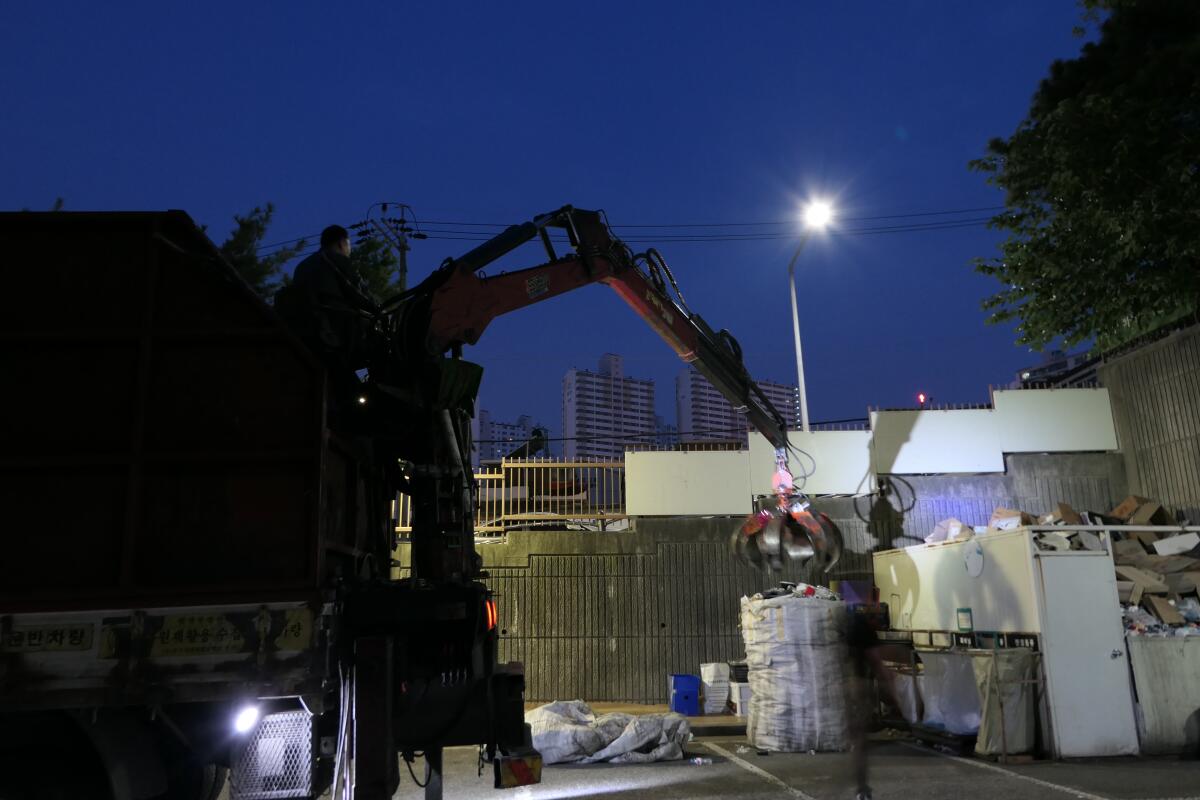
- Share via
GOYANG, South Korea — By the time day breaks, Lee Yong-gi is at his fourth apartment complex, well into his daily rounds collecting the plastic detritus of urban life.
Each day, he and his drivers haul away the recyclables of 6,000 households in Seoul, amounting to about 50 tons, about 20 of it plastic. He rides into the city in a rattling 5-ton truck with a window that won’t roll up and a robotic claw that snatches tarp bags full of trash. Awaiting him this morning are a toilet seat, half an office chair, a sea of takeout containers and rolling hills of plastic bottles.
His used to be a simple life. He’d pay the apartment managers for trash and then sell it to recycling centers. He made a modest living for 40 years this way. But little is like it was before, and in recent months Lee has been struggling with a dispiriting calculus: He’s not only paying to collect the plastic, but also for someone else to take much of it off his hands.
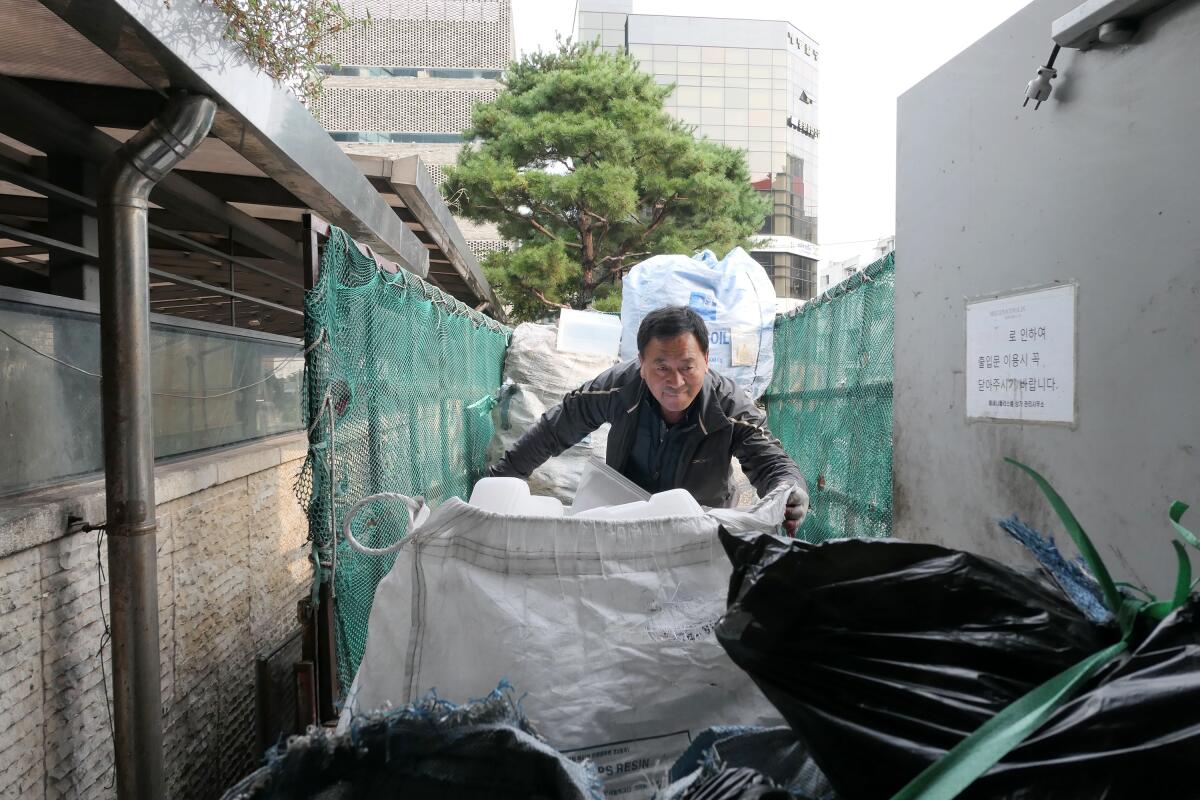
With a surge in plastic waste amid the COVID-19 pandemic, recyclers such as Lee have been busier than ever. But larger forces are conspiring against him. Increased plastic use combined with falling oil prices that make new plastic much cheaper — along with closed borders and disruptions in the global trade in recyclables — has made his business untenable. There’s too much plastic to get rid of.
Clattering through the dawn — here and gone before most awaken — Lee is essential to this densely packed metropolis. If he doesn’t make his rounds, the plastic tide will rise, surging through streets and alleys, spilling across sidewalks.
::
There may be no more honest snapshot of how a city lives than what it throws away.
When Lee started in the business as a 19-year-old in 1977, South Korea was an impoverished nation that let little go to waste. Some collectors dug through trash to gather everything from metal to animal bones to be used in cosmetics. Lee hunted scrap flooring and rope. In 1985, he bought his first truck and became his own boss.
As years went by, the trappings of new wealth brought by the country’s rapid industrialization could be found in its dumpsters — much of it in the form of single-use plastic. In 1995, a comprehensive recycling system was set up, and by the mid-2000s, South Korea was recycling some 60% of its trash, one of the highest rates around the world.
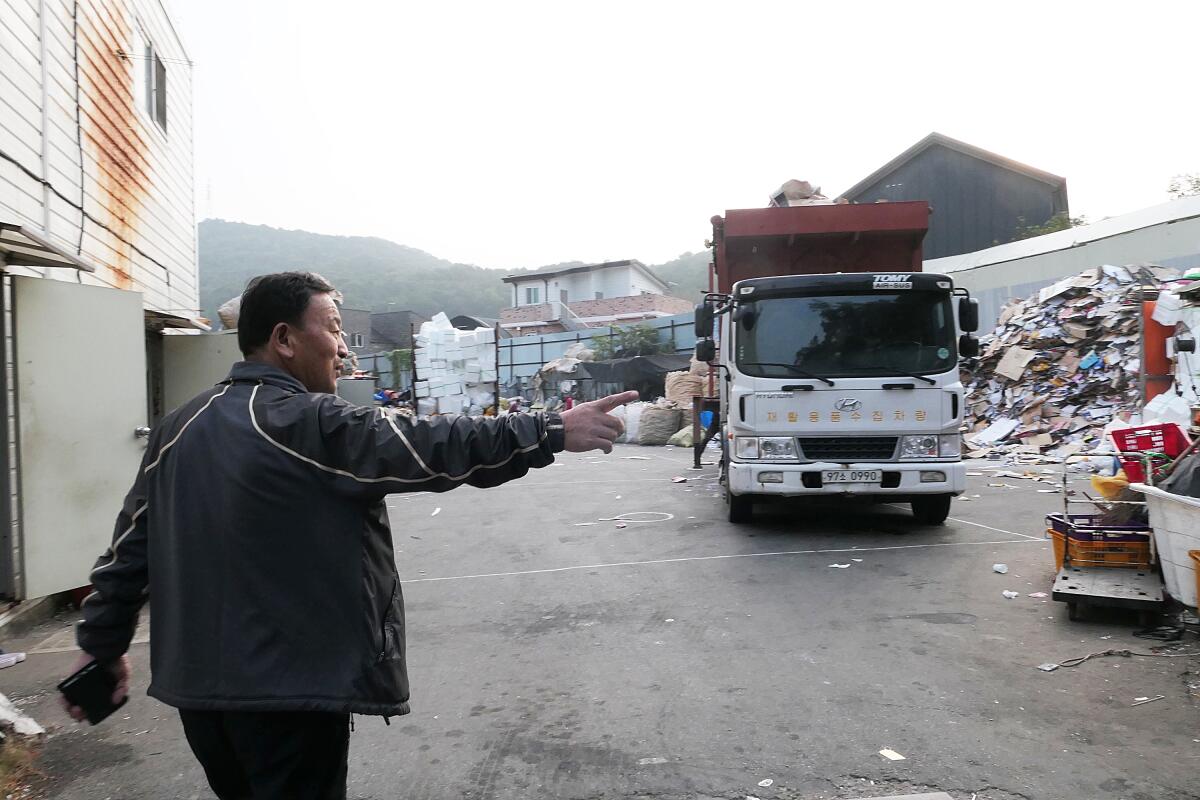
In the greater Seoul area, home to nearly half of South Korea’s population, that system depended heavily on small-scale, privately run collection businesses such as Lee’s — and their profitability. Lee said the heyday of his business was in the lead-up to the 2008 Summer Olympics in Beijing, when China was importing large amounts of recyclables from around the world to fill its seemingly insatiable need.
That ended abruptly in 2018 when China stopped importing most plastics. Interruptions were felt around the world, forcing countries including South Korea to come to terms with the fact that even the most smooth-running recycling system would collapse if there is no one willing to take plastic.
Just as South Korea was attempting to retool its recycling industry, the coronavirus hit and suddenly plastic was everywhere as robust and rapid delivery services relied on disposal containers for restaurant food, groceries and household goods.
::
The scenario has become a scourge for environmentalists, and even for collectors such as Lee, who is losing money to keep his long-standing contracts and paying to get rid of his recyclables in a glut of plastic.
“Everything we’ve been striving for for years has been wiped out in one blow,” said Hong Su-yeol, a South Korean activist and resource recycling consultant who has been urging an overhaul of the industry for about 20 years. “The number of disposable masks alone is probably more than the quantity we’ve been scaling back over a decade.”
With social distancing measures announced by the government came waves of plastic waste. But Lee said much of it, including containers from meal deliveries, can’t be recycled because it’s covered with food or improperly disposed. Volumes increased by about a third compared with pre-pandemic levels in the apartment complexes he has contracts with, he said.
It’s given urgency to the thoughts that he has harbored over the decades. As much as he’s depended on the city’s discards for his living, seeing the quantities of plastic thrown away each day have made Lee something of an accidental environmentalist, fretting about where the world is headed.
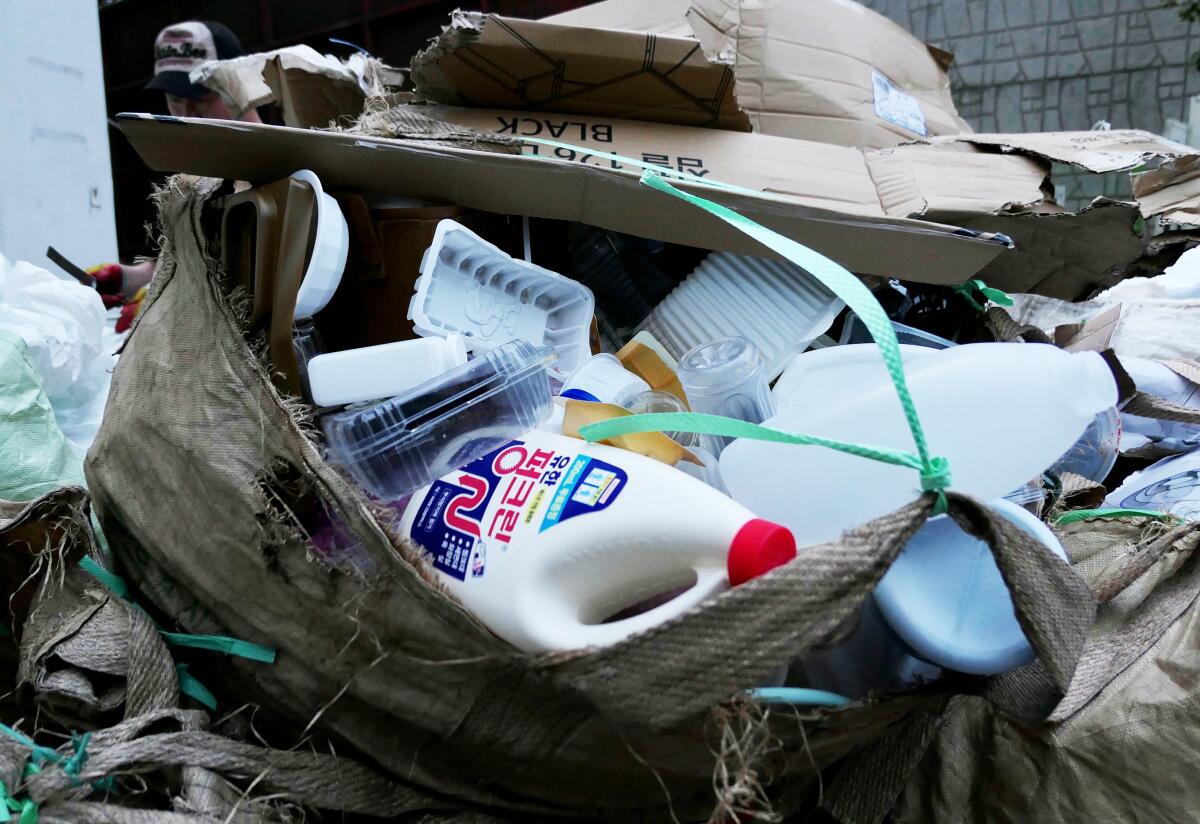
“Anything that can’t be recycled goes in the ground or out to sea.... It’s going to be around 17 generations from now,” said the father of three daughters, who has a broad face and Buddha-like earlobes. “We’re living on land borrowed from future generations.”
::
At a recycling center in Yongin, southeast of Seoul, 47 employees have been working overtime and throughout weekends to sort through the trash they were running out of space to store.
“It’s been peak-season levels all year,” manager Jeong Yong-deok said. Between January and August, the center has received about 12% more recycling to sort, clean and process compared with last year, he said. Nationwide, there was 15.6% more plastic waste in the first half of the year than the same period in 2019, increasing by as much as 25% year over year in the month of June, according to the Ministry of Environment.
The South Korean government has announced emergency measures to buy up excess plastic and stockpile it, to help keep the industry going. It also began hiring more than 10,000 “resource management helpers” around the country to be stationed at apartment complexes to improve the quality of recyclables being collected by removing labels and tape and cleaning off food residue. The program is part of an economic stimulus to create jobs amid the pandemic.
Hong, the consultant, said those are stopgap measures in a pandemic that has amplified a preexisting problem. He said the dependence on private, small-scale recycling collectors was an unsustainable strategy vulnerable to the slightest economic vicissitudes of the global trade in recyclables.
He added that South Korea needs to be able to produce higher-quality recycled material like textiles, for which there is demand from environmentally conscious retailers.
“It’s like CPR when what you really need is a major surgery,” he said.
::
Lee deftly maneuvers the giant metal claw over the pair of tarpaulin sacks brimming with plastic, then clutches the heap. The crinkling of bottles and plastic containers inside rings out in the predawn quiet.
He swivels the arm with the claw around to dump the load into his truck, then shakes out the sacks as if he is waving a handkerchief with a massive robotic hand. He swivels it back, drops the sack on the ground and moves on to the next pile in an unending supply of discarded plastic.
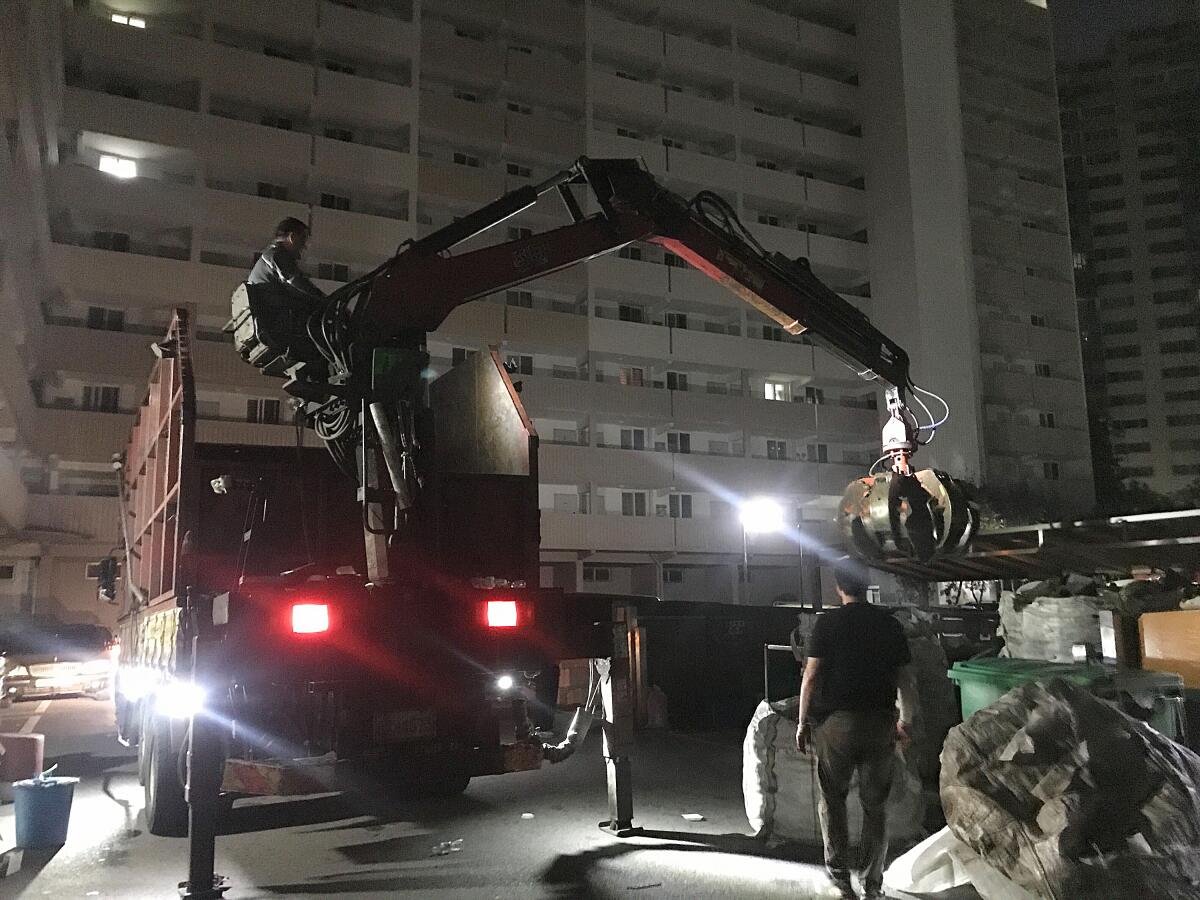
On his route weaving through various parts of Seoul are a public housing complex and a newly built snazzy high-rise with an unpronounceable name. The wealthier the area, he’s found, the larger the heaps of waste. He worries that South Korea, with a living standard he never could have imagined when he was younger, is incurably addicted to the convenience afforded by plastic.
“Plastic is too deeply ingrained in us,” he said.
To keep his business afloat, Lee has taken out a loan of 200 million won, about $175,000. He doesn’t know how much longer he can keep it going, when he’s being squeezed from both ends, paying about 4 cents a pound for the plastic he collects, then shelling out an additional 1.5 cents a poundfor a recycling plant to take it.
But the plastic continues to flow — so for now, he goes on collecting.
More to Read
Sign up for Essential California
The most important California stories and recommendations in your inbox every morning.
You may occasionally receive promotional content from the Los Angeles Times.











